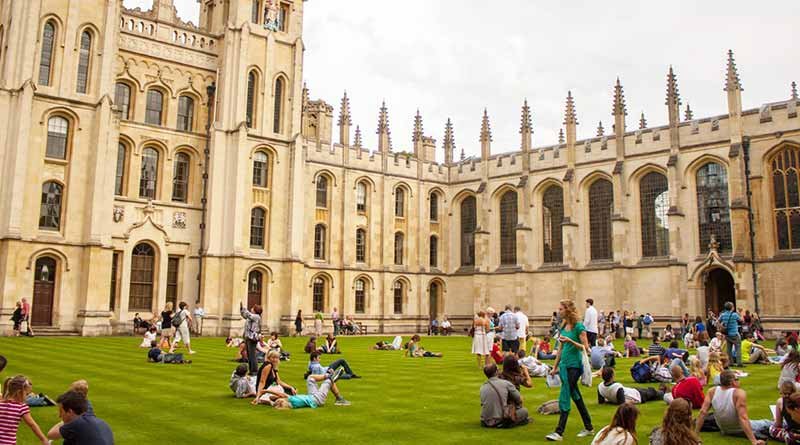UNIVERSITY OF OXFORD
Today we are here with a review for the world’s second-oldest university, the house of one of the world’s oldest and most prestigious scholarships, institute who ha has educated many notable alumni from it’s 38 constituent colleges and largest academic library system.
This epic ambiance is none other than The University of Oxford, which is informally also known as Oxford University or Oxford. This University resides at the central southern city, Oxford of England. If we go back in history to study about the existences of The University of Oxford then there is no such known date of foundation but there exist some evidence that according to them this university is educating since 1096 and thus it has become the second oldest English speaking university at the global level. In 1167 when Henry Curtmantle or Henry II banned his English students from pursuing their studies further from the University of Paris then that decision proves to be a rising moment for Oxford and hence from 1167, it started growing rapidly. A few years later townsfolk of Oxford city and students of the University of Oxford had a dispute and as a result, University of Cambridge established when some academics headed towards in the northeast to the Cambridge city. Today these the two ancient universities are frequently referred to as “Oxbridge”.
Guys now let us study about Oxford. First of all, I would like to tell you that it is a collegiate university. A collegiate university is a university which is composed of different colleges or departments. UO is consist of a central University and some thirty-eight colleges. It provides a wide range of resources for both teachings and learning in the form of administrative services, laboratories, libraries, museums, research centers, student services such as careers and counseling and various departments which often work together on interdisciplinary research projects and teaching joint courses. All the academic and administrative departments, libraries museums and research centers are possessed by the central University while the colleges are related to it in an amalgamating manner.
In addition to this, it provides accommodation, meals, common rooms, libraries, sports and social facilities, and pastoral care to their students. And even the college is itself an accommodation as faculties who are doing teaching there can teach their part and use the library to study for the rest of their time. This university provides more than thousands of courses which are listed below:
Course List
A
African Studies MSc
Ancient History DPhil
Ancient Philosophy MSt
Anthropology DPhil
Applied Landscape Archaeology MSc
Applied Linguistics and Second Language Acquisition MSc
Applied Theology MTh
Applied Theology PGDip
Archaeological Science MSt
Archaeological Science DPhil
Archaeological Science MSc
Archaeology DPhil (part-time)
Archaeology MPhil
Archaeology MSt
Archaeology DPhil
Architectural History DPhil
Architectural History PGCert
Area Studies DPhil
Astrophysics DPhil
Atmospheric, Oceanic, and Planetary Physics DPhil
Atomic and Laser Physics DPhil
Autonomous Intelligent Machines and Systems EPSRC CDT
B
Bachelor of Civil Law BCL
Bible Interpretation MSt
Biochemistry DPhil
Biochemistry MSc by Research
Biochemistry (OU/TSRI) DPhil
Biodiversity, Conservation and Management MPhil
Biodiversity, Conservation and Management MSc
Biomedical and Clinical Sciences DPhil
Biomedical Imaging EPSRC and MRC CDT
Biomedical Sciences: NIH-OU DPhil
British and European History, from 1500 to the Present MSt
British and European History, from 1500 to the Present MPhil
Buddhist Studies MPhil
C
Cardiovascular Science DPhil
Celtic Studies MPhil
Celtic Studies MSt
Chemical Biology DPhil
Chemical Biology MSc by Research
Chromosome and Developmental Biology DPhil
Classical Archaeology MPhil
Classical Archaeology DPhil
Classical Archaeology MSt
Classical Hebrew Studies MSt
Classical Indian Religion MPhil
Classical Languages and Literature DPhil
Clinical Embryology MSc
Clinical Medicine DPhil
Clinical Neurosciences MSc by Research
Clinical Neurosciences DPhil
Clinical Psychology DClin Psych
Cognitive and Evolutionary Anthropology MSc
Cognitive Behavioural Therapy PGCert
Cognitive Behavioural Therapy DPhil
Cognitive Behavioural Therapy MSc
Cognitive Behavioural Therapy PGDip
Comparative Philology and General Linguistics DPhil
Comparative Social Policy MSc
Comparative Social Policy MPhil
Computer Science MSc
Computer Science DPhil
Condensed Matter Physics DPhil
Contemporary Chinese Studies MSc
Creative Writing MSt
Criminology DPhil
Criminology and Criminal Justice MSc
Cuneiform Studies MPhil
Cyber Security EPSRC CDT
D
Development Studies MPhil
Diamond Science and Technology EPSRC CDT
Diplomatic Studies MSt
Diplomatic Studies PGDip
Diplomatic Studies PGCert
E
Earth Sciences DPhil
Eastern Christian Studies MPhil
Ecological Survey Techniques PGCert
Economic and Social History MPhil
Economic and Social History MSc
Economics DPhil
Economics MPhil
Economics for Development MSc
Education DPhil
Education (Child Development and Education) MSc
Education (Comparative and International Education) MSc
Education (Higher Education) MSc
Education (Learning and Technology) MSc
Education (Research Design and Methodology) MSc
Egyptology MPhil
Endovascular Neurosurgery (Interventional Neuroradiology) MSc
Engineering Science DPhil
Engineering Science MSc by Research
English DPhil
English (1550-1700) MSt
English (1700-1830) MSt
English (1830-1914) MSt
English (1900-Present) MSt
English (650-1550) MSt
English and American Studies MSt
English Local History MSc
English Local History DPhil
English Studies (Medieval Period) MPhil
Enhanced Cognitive Behavioural Therapy PGCert
Environmental Change and Management MPhil
Environmental Change and Management MSc
Environmental Research NERC DTP
Evidence Based Health Care (Medical Statistics) MSc
Evidence Based Health Care (Systematic Reviews) MSc
Evidence-Based Health Care DPhil
Evidence-Based Health Care MSc
Evidence-Based Social Intervention and Policy Evaluation MPhil
Evidence-Based Social Intervention and Policy Evaluation MSc
Executive MBA EMBA
Experimental Psychology DPhil
Experimental Psychology MSc by Research
Experimental Psychology (4-year ESRC-funded) combined MSc and DPhil
Experimental Therapeutics MSc
F
Film Aesthetics MSt
Financial Economics MSc
Financial Strategy PGDip
Fine Art MFA
Fine Art DPhil
G
Gas Turbine Aerodynamics EPSRC CDT
General Linguistics and Comparative Philology MPhil
General Linguistics and Comparative Philology MSt
Genomic Medicine and Statistics DPhil
Geography and the Environment DPhil
Global and Imperial History MSt
Global Business PGDip
Global Governance and Diplomacy MSc
Global Health Science MSc
Greek and/or Latin Languages and Literature MPhil
Greek and/or Latin Languages and Literature MSt
Greek and/or Roman History MPhil
Greek and/or Roman History MSt
H
Health Research PGDip
Health Research PGCert
Historical Studies PGCert
Historical Studies MSt
History DPhil
History (History of Science and Medicine & Economic and Social History) DPhil
History of Art DPhil
History of Art and Visual Culture MSt
History of Design MSt
History of Science, Medicine and Technology MPhil
History of Science, Medicine and Technology MSc
I
Industrially Focused Mathematical Modelling EPSRC CDT
Infection, Immunology and Translational Medicine DPhil
Information, Communication and the Social Sciences DPhil
Inorganic Chemistry DPhil
Inorganic Chemistry MSc by Research
Integrated Immunology MSc
Intellectual Property Law and Practice PGDip
Interdisciplinary Bioscience BBSRC DTP
International Development DPhil
International Health and Tropical Medicine MSc
International Human Rights Law MSt
International Relations DPhil
International Relations MPhil
International Wildlife Conservation Practice PGDip
Ion Channels and Disease DPhil
Islamic Art and Archaeology MSt
Islamic Art and Archaeology MPhil
Islamic Studies and History MSt
Islamic Studies and History MPhil
J
Japanese Studies MSc
Japanese Studies MPhil
Jewish Studies MSt
Jewish Studies in the Graeco-Roman Period MPhil
Jewish Studies in the Graeco-Roman Period MSt
Judaism and Christianity in the Graeco-Roman World MPhil
K
Korean Studies MSt
L
Late Antique and Byzantine Studies MSt
Late Antique and Byzantine Studies MPhil
Latin American Studies MPhil
Latin American Studies MSc
Law DPhil
Law MPhil
Law and Finance MSc
Learning and Teaching MSc
Legal Research MSt
Literature and Arts MSt
Literature and Arts DPhil
M
Magister Juris MJur
Major Programme Management MSc
Management Studies DPhil
Master of Business Administration MBA
Master of Business Administration Oxford 1+1 MBA program
Materials DPhil
Materials MSc by Research
Mathematical and Computational Finance MSc
Mathematical and Theoretical Physics MSc
Mathematical Finance MSc
Mathematical Modelling and Scientific Computing MSc
Mathematics DPhil
Mathematics MSc by Research
Mathematics and Foundations of Computer Science MSc
Medical Anthropology MPhil
Medical Anthropology MSc
Medical Sciences DPhil
Medicine Graduate entry
Medieval and Modern Languages DPhil
Medieval History MSt
Medieval Studies MSt
Migration Studies MSc
Modern Chinese Studies MPhil
Modern Languages MSt
Modern Languages MPhil
Modern Middle Eastern Studies MPhil
Modern South Asian Studies MPhil
Modern South Asian Studies MSc
Molecular and Cellular Medicine DPhil
Molecular Cell Biology in Health and Disease DPhil
Musculoskeletal Sciences DPhil
Musculoskeletal Sciences MSc by Research
Music DPhil
Music (Composition) MSt
Music (Composition) MPhil
Music (Musicology) MSt
Music (Musicology) MPhil
Music (Performance) MSt
Music (Performance) MPhil
N
Nanotechnology PGCert
Nanotechnology for Medicine and Health Care MSc
Nature, Society, and Environmental Governance MPhil
Nature, Society, and Environmental Governance MSc
Neuroscience MSc
Neuroscience (4-year Wellcome Trust DTP) combined MSc and DPhil
New and Sustainable Photovoltaics EPSRC CDT
O
Obstetrics and Gynaecology DPhil
Obstetrics and Gynaecology MSc by Research
Oil and Gas NERC CDT
Oncology DPhil
Oncology MSc by Research
Organic Chemistry DPhil
Organic Chemistry MSc by Research
Organisational Leadership PGDip
Oriental Studies DPhil
Oriental Studies MSt
P
Paediatric Infectious Diseases MSc
Paediatric Infectious Diseases PGDip
Paediatrics DPhil
Partial Differential Equations EPSRC CDT
Particle Physics DPhil
PGCE
Pharmacology DPhil
Pharmacology MSc by Research
Pharmacology MSc
Philosophical Theology MPhil
Philosophical Theology MSt
Philosophy DPhil
Philosophy BPhil
Philosophy of Physics MSt
Physical and Theoretical Chemistry DPhil
Physical and Theoretical Chemistry MSc by Research
Physiology, Anatomy and Genetics MSc by Research
Physiology, Anatomy and Genetics DPhil
Plant Sciences DPhil
Political Theory Research MSc
Politics DPhil
Politics (Comparative Government) MPhil
Politics (European Politics and Society) MPhil
Politics (Political Theory) MPhil
Politics Research MSc
Population Health DPhil
Primary Health Care DPhil
Primary Health Care MSc by Research
Psychiatry DPhil
Psychiatry MSc by Research
Psychodynamic Counselling PGCert
Psychodynamic Practice MSt
Psychodynamic Practice PGDip
Psychological Research MSc
Public Policy MPP
Public Policy DPhil
R
Radiation Biology MSc
Radiation Oncology combined MSc and DPhil
Refugee and Forced Migration Studies MSc
Renewable Energy Marine Structures (DPhil) EPSRC CDT
Renewable Energy Marine Structures (DEng) EPSRC CDT
Russian and East European Studies MPhil
Russian and East European Studies MSc
S
Science and Application of Plastic Electronic Materials EPSRC CDT
Science and Engineering for Arts, Heritage and Archaeology EPSRC CDT
Science and Technology of Fusion Energy EPSRC CDT
Slavonic Studies MPhil
Slavonic Studies MSt
Sleep Medicine PGDip
Sleep Medicine MSc
Social Anthropology MPhil
Social Anthropology MSc
Social Intervention DPhil
Social Policy DPhil
Social Science of the Internet MSc
Socio-Legal Research MSt
Socio-Legal Studies DPhil
Sociology DPhil
Sociology MSc
Sociology and Demography MPhil
Software and Systems Security MSc
Software Engineering MSc
Statistical Science PGDip
Statistical Science MSc
Statistical Science EPSRC and MRC CDT
Statistics DPhil
Statistics MSc by Research
Strategy and Innovation PGDip
Structural Biology DPhil
Study of Religion MSt
Surgical Science and Practice MSc
Surgical Sciences DPhil
Surgical Sciences MSc by Research
Sustainable Urban Development DPhil
Sustainable Urban Development MSc
Synthesis for Biology and Medicine EPSRC CDT
Synthetic Biology EPSRC and BBSRC CDT
Syriac Studies MSt
Systems Approaches Biomedical Science EPSRC and MRC CDT
T
Taxation MSc
Teacher Education MSc
Teaching English Language in University Settings MSc
Theology DPhil
Theology MPhil
Theology MSt
Theology BTh
Theology and Religion PGDip
Theoretical and Computational Chemistry (Stand-Alone) MSc
Theoretical Physics DPhil
Theory and Modelling in Chemical Sciences EPSRC CDT
Tibetan and Himalayan Studies MPhil
Traditional China MSt
Traditional East Asia MPhil
U
US History MSt
V
Visual, Material and Museum Anthropology MSc
Visual, Material and Museum Anthropology MPhil
W
Water Science, Policy and Management MPhil
Water Science, Policy and Management MSc
Women’s Studies MSt
World Literatures in English MSt
Y
Yiddish Studies MSt
Z
Zoology DPhil
Admissions
Well till now the University of Oxford have made you excited to study there and I’m sure you are curious to know about the admission process of Oxford. So let me tell you, my folks, that there are four modules in which you can take admission and study at the University of Oxford. These modules are:
- Undergraduate Course
- Graduate Course
- Continuing education course
- Undergraduate open day
Now the question arises how you will get admission in any of the above modules as we all know taking admission in Oxford is a hard nut to crack. So if you want to apply for any of the above modules then you have to go through a selection procedure which is consists of five different stages or levels or hurdles.
I’m going to give you a brief about all these stages so that you can prepare yourself for your dream education. So let us first have an introduction with these stages and then we will study a brief about them. The stages you have to go through are listed below:
- Tests
- UCAS application Visa
- Written work
- Interviews
- Decisions
Tests
So, the first stage tests and for any kind of enrolment or admission we have to go through a particular examination but in Oxford, you just don’t have to give a written exam but also you have to survive various other phases as well.
The first thing you have to do is to register yourself for the test of the course or stream you want to pursue and make sure that you have to register separately for every course you want to apply for and that too on or before a set date of October month, decided by the authorizes.
To pursue any course you need to give a test because without giving a test your application will not be entertained.
Once you clear this level then second will be to apply for UCAS application to study in the UK but you have to wind up all the UCAS work a year ago before applying to Oxford.
UCAS stands for Universities and Colleges Admissions Service, which is a UK-based Non-profit organization and works mainly for the operation of application process for British universities such as University of Aberdeen, Anglia Ruskin University, University of Birmingham, Imperial College London, University of London, University of Manchester University of Oxford, University of Cambridge and much more.
The applications forms to apply for UCAS launches every year in September till 1800 hrs. according to UKST of 15th October, therefore you have to be very active during this tenure so that you can apply quickly apply for it and I have told you earlier that they won’t entertain late applications.
UCAS application
If you want to study at Oxford from the core of your heart then, you need to apply a year before the start date of your course by completing the online application form at the official website of UCAS. These application forms launch in early September and the deadline is 6 pm UK time on 15 October every year. Late applications cannot be accepted.
Written work
Now the next hurdle comes is written work. If your selected course falls in such category then you have to send some of your written work along with your application and that too marked by a teacher.
Well don’t get panic for the written stuff because once you send your application form then the concern college or department will be touch with you to update you on your written work i.e. how to send it either by post or electronically or what to send etc. and that happens iff your selected course demands some written work. Your written work includes your language, writing and reasoning skills required for the desired course you have chosen in either written or typed and marked by a teacher in addition to this it should be neat and clean without any kind of correction and editing.
It is advisable to keep a copy of every sheet including work and application form you share with the desired department so that in the case of any loss you can recover it.
Interviews
Now here comes the fourth and one of the most haunted stage and that is interviews. Every person is scared of giving interviews and even some are so scared that spelling out the word is hard enough to scare them but guys there is nothing to be scared from interviews.
This is just conversation round between the interviewer and you regarding your skills and course are chosen by you only. You can consider this as just you are enquiring about a new gadget from a retailer or seller.
Decisions
Now here comes the last stage of selection and this process is termed as decisions or selection process where the selection committee will examine and analyze your overall performance i.e. from test to your interview. The candidates who have been selected will be informed in the month of January that their application has been selected or not. The campus also informs you about some conditional and unconditional offers which means that you have not yet completed all your current qualifications and hence you couldn’t satisfy the necessary condition and once you complete then your place will be confirmed or if you completed all your qualifications and you couldn’t meet with necessary academics conditions then your place will be confirmed after the completion of those conditions.
Fees and funding
So now you have got admission in the University of Oxford, now the point is how much you have to pay to study overseas. Well if talk about Oxford then let me tell you that University understands every student’s pocket and in this direction University is so committed that it always ensures that the fees shouldn’t act as a hurdle for the success of students who are aspiring to study overseas and especially in Oxford.
Oxford is so loyal towards its commitment that it provides non-repayable scholarships to support and enhance student and in addition to this, the government also supports the students by providing loans to them and that too without any kind of upfront.
The fees payment is divided into two sections
- Tuition fees
- Living costs
The tuition fees are the fees that you will be charged for your course and study material. This fees can be determined easily with the support of either government or by the university itself. They have made few categories under which they put you on the scholarship such as EU which means rest of European Union apart from UK i.e. people living in Europe continent but not in the United Kingdom like France, Italy, other is Home in which you will be placed if you are a native of UK then Overseas in which students staying outside Europe continent such as USA, India, Australia will be considered.
The second category is living costs and you will pay this for your own lifestyle. Such as your accommodations or meal and friends this could be ranging from £1,002 to £1,471 per month and for this, you will not going to have any support from the government unless you falls in Home category.
So if you think that above mention costs are heavy for your pockets then you don’t need to worry my friend the government of United Kingdom and administrators of the University of Oxford are standing by your side all the time if you’re talented enough and having money as a barrier in your path.
As I said earlier they are providing you full funding and that too without any kind of upfront. If you are a student from either United Kingdom or from any part of Europe and applying for the undergraduate student program then you can claim all tuition fees against a loan taken from the government.
If we talk about the support provided by the University then this University provides a special funding named Oxford Bursaries for the students of the United Kingdom or Europe by proving an annual non-repayable fund. Please make sure that the amount of bursary providing to you will depend on your household income.
Till now if you are not sure for any topic or section or couldn’t decide which course should be chosen then you can contact the executives and can clear all your doubts.




